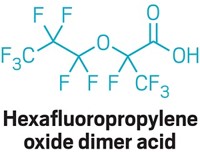Advertisement
Grab your lab coat. Let's get started
Welcome!
Welcome!
Create an account below to get 6 C&EN articles per month, receive newsletters and more - all free.
It seems this is your first time logging in online. Please enter the following information to continue.
As an ACS member you automatically get access to this site. All we need is few more details to create your reading experience.
Not you? Sign in with a different account.
Not you? Sign in with a different account.
ERROR 1
ERROR 1
ERROR 2
ERROR 2
ERROR 2
ERROR 2
ERROR 2
Password and Confirm password must match.
If you have an ACS member number, please enter it here so we can link this account to your membership. (optional)
ERROR 2
ACS values your privacy. By submitting your information, you are gaining access to C&EN and subscribing to our weekly newsletter. We use the information you provide to make your reading experience better, and we will never sell your data to third party members.
Environment
EPA Dismisses Dioxin Study
by Cheryl Hogue
October 12, 2009
| A version of this story appeared in
Volume 87, Issue 41

A scientific study of human exposure to dioxins downstream of Dow Chemical’s flagship plant is of “limited value” to regulators, according to EPA. The study, by researchers at the University of Michigan and funded by Dow on an unrestricted grant, finds that living on dioxin-contaminated soil does not contribute to the levels of polychlorinated dioxins in people’s blood. The results of the study were expected to influence the extent of the cleanup Dow will conduct in the Tittabawassee River, Saginaw River, and Saginaw Bay downstream of the company’s plant in Midland, Mich. These waterways are contaminated with chlorinated furans and dioxins from the company’s manufacturing processes. Although EPA says the Michigan study is well conducted and provides credible information, the agency complains that its use will be limited because the study did not include exposure in children, and it is unclear what level of exposure was received by individuals living in highly contaminated areas. Dow is reviewing EPA’s critique of the University of Michigan study in detail, says Mary Draves, a Dow spokeswoman. EPA and Dow are working out a cleanup plan for the area and are expected to announce a proposed agreement in mid-October.




Join the conversation
Contact the reporter
Submit a Letter to the Editor for publication
Engage with us on Twitter